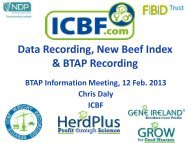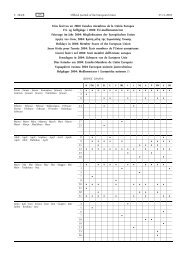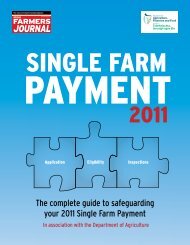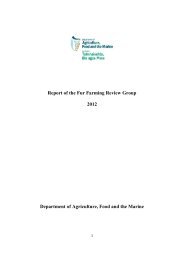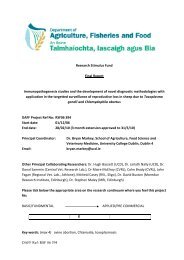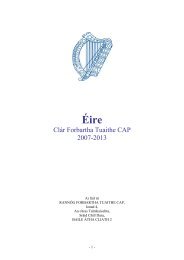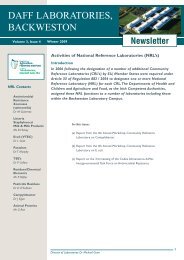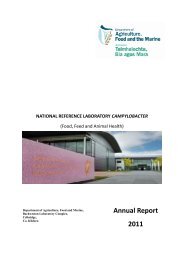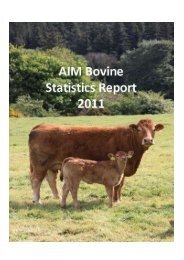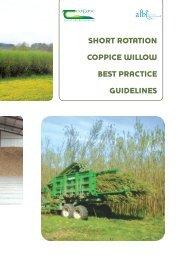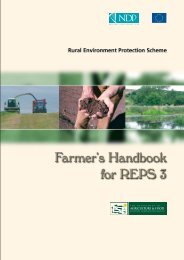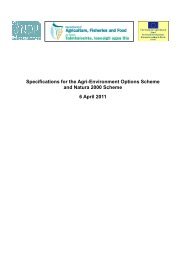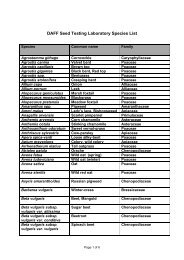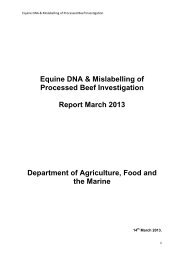Food Research Ireland - Department of Agriculture
Food Research Ireland - Department of Agriculture
Food Research Ireland - Department of Agriculture
Create successful ePaper yourself
Turn your PDF publications into a flip-book with our unique Google optimized e-Paper software.
Over the last decade, institutional research has been vibrant in this<br />
priority area. DAFM have funded in the region <strong>of</strong> 71 projects addressing<br />
food for health and nutrition; as well as cob-funded four programmes<br />
with the Health <strong>Research</strong> Board under the <strong>Food</strong> and Health <strong>Research</strong><br />
Initiative. This funding has led to expertise, capability and facilities that<br />
have delivered functional ingredients and foods as well as techniques to<br />
validate nutritional claims in vitro and in vivo. Irish scientists are leading<br />
Europe in the development <strong>of</strong> food consumption and lifestyle databases;<br />
these resources are <strong>of</strong> national importance to policy makers and the food<br />
industry in providing a platform for a national strategy for health and<br />
wellness. Interpreting these data is the job <strong>of</strong> our nutritional scientists.<br />
Together with the agencies and the food industry they have identified<br />
key areas <strong>of</strong> importance to the health <strong>of</strong> the population e.g. salt<br />
reduction, fortification <strong>of</strong> food with folic acid, vitamin D etc. FIRM have<br />
invested significant recourses in the area <strong>of</strong> food and health for over 15<br />
years and the capability generated has led to collaborative funding with<br />
the Health <strong>Research</strong> Board, the Marine Institute and more industryfocused<br />
funding from other agencies, e.g. Enterprise <strong>Ireland</strong>.<br />
FOOD BUSINESS AND CONSUMER SCIENCE<br />
Insights into consumers’ behaviour and attitudes are key areas <strong>of</strong><br />
expertise for Irish researchers who generate knowledge on consumers’<br />
wants, needs and perceptions, which are useful in developing and<br />
marketing new products and in assessing consumer and industry<br />
acceptability <strong>of</strong> novel food technologies. Understanding the market and<br />
consumer, supports new product development, innovation<br />
management, strategic market planning, marketing channels, and<br />
relationship management.<br />
New product development involves a number <strong>of</strong> areas <strong>of</strong> expertise<br />
including retail, branding, modelling business processes, process<br />
innovation and innovation management and understanding the<br />
consumer. Irish researchers have worked directly with food companies<br />
to identify new market opportunities.<br />
Risk perception is the subjective judgment that people make about the<br />
characteristics and severity <strong>of</strong> a risk, for example a food safety scare or<br />
the introduction <strong>of</strong> a novel technology (high pressure processing).<br />
<strong>Research</strong>ers have worked together to understand how and why<br />
consumers perceive risk and have developed successful communication<br />
strategies. In addition, an online survey called Longitudinal Monitor <strong>of</strong><br />
<strong>Food</strong> Risk Perception was set up to monitor the perceptions, attitudes<br />
and behaviour <strong>of</strong> Irish people to a variety <strong>of</strong> food risks.<br />
<strong>Food</strong> business researchers work extensively on the dynamics <strong>of</strong> food<br />
supply chains for the benefit <strong>of</strong> stakeholders; and on understanding retail<br />
activity, trends and performance. <strong>Food</strong> economics and the impact <strong>of</strong><br />
national and international regulation and policy on the agriculture and<br />
food industry is also a focus <strong>of</strong> Irish researchers.<br />
FOOD SAFETY<br />
A wide variety <strong>of</strong> research is undertaken in the identification, detection and<br />
control <strong>of</strong> food-borne pathogens and spoilage organisms. <strong>Research</strong>ers<br />
within the Centre for <strong>Food</strong> Safety have expertise in many areas including<br />
detection and surveillance <strong>of</strong> Enterobacter sakazaki, Campylobacter,<br />
Salmonella, Yersinia enterocolitica, Escherichia coli, Toxoplasma gondi,<br />
microbial quantitative risk assessment, microbial genomics and<br />
bioinformatics. The UCD Centre for <strong>Food</strong> Safety is the designated World<br />
Health Organisation (WHO) Collaborating Centre for <strong>Research</strong>, Reference<br />
and Training on Cronobacter. The Centre for <strong>Food</strong>-borne Zoonomics (CFZ)<br />
(www.cfz.ie), was established in 2007 and is led by a group <strong>of</strong> food safety<br />
experts. These scientists are working closely with the food industry and<br />
regulatory agencies to reduce the incidences <strong>of</strong> food-borne poisoning<br />
associated with Gram negative pathogens, including Salmonella and VTEC.<br />
The research focuses on the genomic and proteomic responses by<br />
pathogens to stress. The network is a collaborative research effort between<br />
a number <strong>of</strong> research institutions and the DAFM laboratories.<br />
<strong>Food</strong> <strong>Research</strong> <strong>Ireland</strong><br />
▼<br />
60<br />
2



